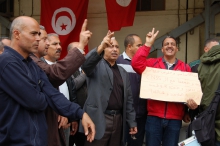Tunisia: Nobel Peace Prize nomination for the UGTT

The nominating universities emphasized the little known – but vital – intervention of the UGTT, when in 2013 it managed to break through a deadlock between political parties during a profound political crisis in Tunisia.
Nasri Zouhaier, General Secretary of the 30,000 strong Fédération Nationale de la Santé (National Federation for the Health Service) stresses the importance of the UGTT’s neutrality in national politics: “It is the best organization right now for Tunisia. The UGTT is very important in civil society.”
Able negotiators
Regarding the crisis in which the UGTT played such a vital role: after Tunisia’s January 2011 revolution, elections were held the following October. Ennahda, the party of political Islam, formed the new government with two other smaller parties. The government formed by these elections was meant to be temporary until a new constitution could be agreed and fresh elections held.
However, by 2013 the deeply divided National Constituent Assembly (ANC) had failed to agree a constitution and elections had not been held. Critics accused the Ennahda government of clinging to power and failing to fight terrorism. In February 2013, Chokri Belaid, a left wing politician, was assassinated outside his home. Then in July, a second left-winger, Mohamed Brahmi met the same fate – also shot outside his home. Both had been critical of Ennahda – which was widely blamed for the killings.
Over 60 ANC deputies ‘went on strike’ outside the ANC building, against political violence and Brahmi’s assassination. Mass public demonstrations were held calling for the resignation of the government. The Ennahda government rallied its supporters in reply. Tunisia’s new democracy was reversing.
On 6 August 2013, the President of the ANC, Mustapha Ben Jaafar, suspended all parliamentary sittings. He asked the UGTT to act as a neutral mediator between the warring political parties.
Why the UGTT? Mohamed Boukhari an assistant general secretary of the Fédération Générale de l’électricité et du gaz (General Federation of Electricity and Gas) explained that the UGTT has always had strong contacts with all parts of Tunisian civil society. Civil society organizations worked closely with the UGTT before and after the revolution because groups “which had a problem with the government came to the UGTT to find a solution”.
With this experience of working with civil society the UGTT brought together UTICA (the employers’ association), the lawyers’ association and the Ligue tunisienne des droits de l’Homme (Tunisian League of Human Rights) to work together on finding a resolution. By September the UGTT- led quartet had negotiated a ‘road map’ for a national dialogue to solve the crisis.
On 9 January 2014, the prime minister and government handed over power to a new government of independent technocrats. On 23 January 2014, Tunisia’s parliament agreed the country’s new constitution. Fresh elections are to be held by the end of 2014. The UGTT had steered Tunisia away from civil war.
As the new constitution came into force, France’s President, Francois Hollande, in a speech to Tunisia’s parliament on 7 February 2014, paid tribute to the UGTT – the union organisation whose first leader had been assassinated by the French 62 years earlier.
UGTT history
Set up during the struggle for independence against French colonialists, the UGTT’s founder and first general secretary, Farhat Hached was assassinated by the French in 1952. Tunisian independence followed four years later, in 1956.
Hundreds of union members were arrested and imprisoned in 1978 by Habib Bourguiba, Tunisia’s independence leader and first president (1957 to 1987) when the UGTT called a general strike against price rises and neoliberal policies. In 1985, after riots erupted over increases in the price of bread, the UGTT was again repressed by the government. In 2008, UGTT activists were at the forefront of the first great revolt in Tunisia’s central mining area against the dictator Zine El Abidine Ben Ali. UGTT grassroots activists supported and led action in Tunisia’s revolution in January 2011, which blossomed into ‘the Arab Spring’.
Anouar Ben Kaddour, a member of the UGTT’s executive committee, estimated total membership to be around 700,000, with some 380,000 public sector members and 70 unions covering different sectors of the economy. He stressed that this Nobel Peace Prize nomination was “an honour for all trade unionists”.
Nasri Zouhaier said of the Nobel nomination: “We are very happy. Sincerely.” Then, he added with pride: “The UGTT continues to work on some important issues: poverty, the young and women’s rights….”
The decision of the Nobel Peace Prize committee will be announced in October 2014. Meanwhile, in time-honoured tradition, the UGTT carries on fighting for justice for working people.
The work goes on
Many concerns are pressing upon the UGTT today. Mohamed Boukhari explains that his union (representing public electricity and gas service workers) has not taken any strike action since the revolution. Although the members have many demands, the UGTT has said that, “this is not yet the moment, we have to wait longer because [Tunisia] needs the money right now. There are people who need the money, the poor, the people who are not working…there are priorities.”
But Boukhari and his colleagues realize that they cannot appeal for restraint for ever. The UGTT – like all union organisations – has to balance the need to negotiate with those in power while responding to the demands of an active rank and file membership. The UGTT is urging the government to act on rising prices, frozen salaries and continued unemployment, particularly of young people.
Report for Public Services International by Tim Baster and Isabelle Merminod.

